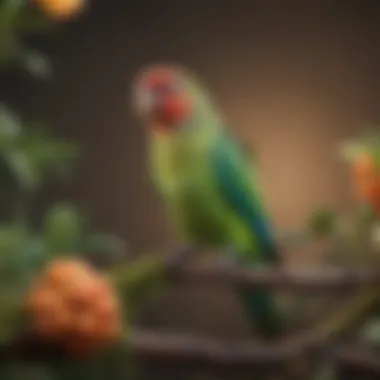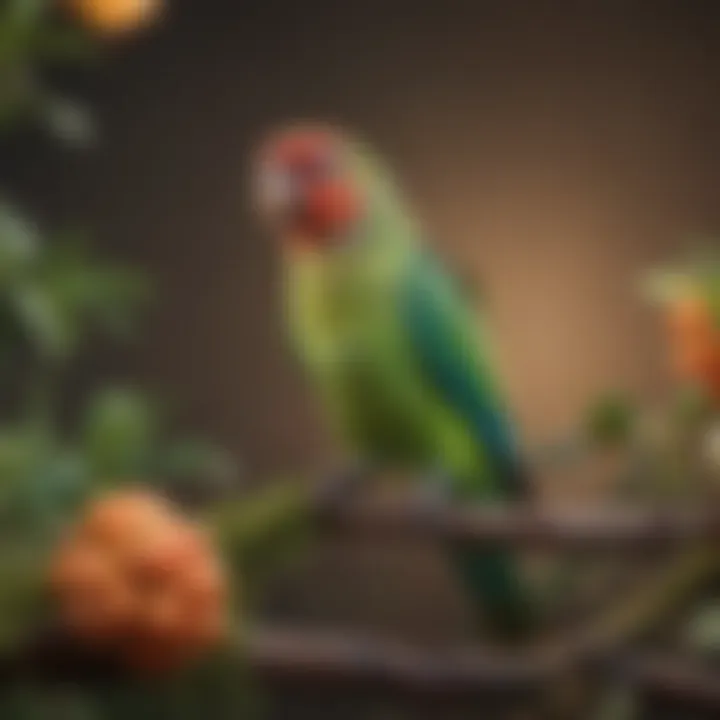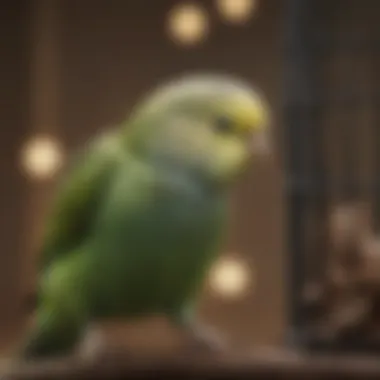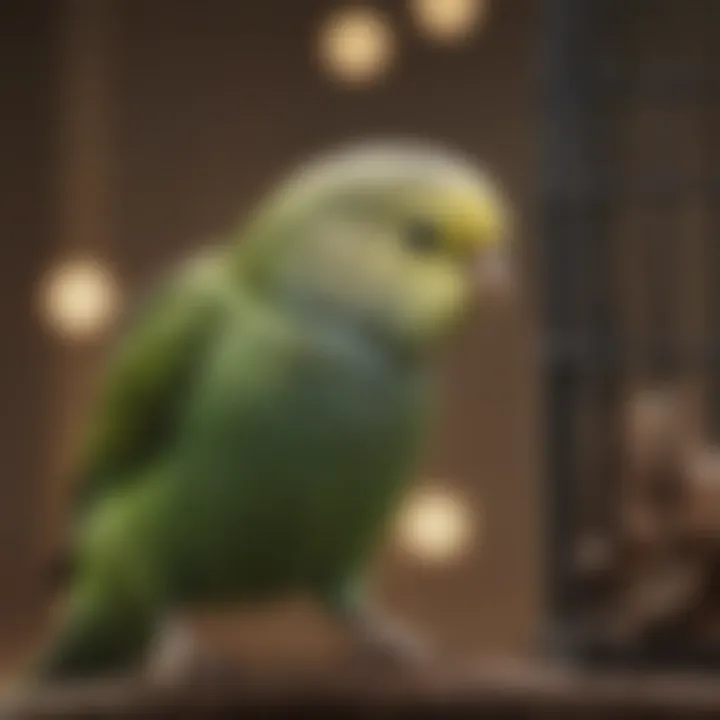Choosing the Right Pet Bird for Your Lifestyle


Intro
Choosing a pet bird can be a journey filled with excitement and expectation, yet it requires thoughtful consideration. Birds are not merely pets; they are companions, each with distinct personalities and needs that can vastly affect the owner's experience. In selecting the right feathered friend, it’s crucial to explore not only their characteristics but also how these attributes mesh with your lifestyle.
As you navigate through this article, you’ll encounter various species and their unique traits, offering insights to help you make an informed choice. Let’s dive in and understand more about these captivating creatures.
Preamble to Pet Birds
When individuals ponder adding a feathered companion to their lives, they often overlook the myriad facets of becoming a bird owner. Pet birds, unlike cats or dogs, present unique considerations that can greatly affect one’s experience. Understanding the cherished place birds hold in human history and the nuances of selecting the right species can empower potential owners to make worthwhile decisions. With a world of birds out there, knowing what aligns with your interests and lifestyle is paramount.
Birdkeeping can be traced back to ancient civilizations, where birds were not just pets but also symbols of beauty and freedom. This rich history gives context to today’s interest in avian companionship. Perhaps you're drawn to the playful spirit of a budgie or the vibrant vocalizations of an Amazon parrot. Knowing their history adds a depth to your relationship, fostering a connection that transcends mere ownership.
History of Bird Keeping
The practice of keeping birds extends back thousands of years, with evidence suggesting domestication of birds as early as 2,000 BC in Egypt. These early interactions laid the groundwork for the rich tapestry of avian companionship we see today. In those ancient times, exotic birds were often symbols of status among the elite. Fast forward to more modern eras, and you will find different species like canaries and finches capturing the hearts of families globally, especially during the Victorian era when birdkeeping became a popular trend.
Birds are not just ornaments in our homes; they symbolize a connection with nature that some might feel has been lost amidst urban lifestyles. As our ancestors cherished the chirps and caws of their avian friends, so too do many today yearn for that companionship, recognizing the emotional and mental benefits they offer.
Importance of Choosing the Right Breed
Selecting a pet bird is akin to a carefully laid plan; it's about compatibility and understanding. The right breed will resonate with your lifestyle and preferences, turning your avian experience from merely owning a pet to cohabitating with a companion.
Different birds have varying characteristics that can greatly affect your daily life. For example, a cockatiel with its charming whistle can bring joy to a family, but the same species might not suit someone who requires a more low-maintenance pet. Likewise, African Greys demand more interaction and mental stimulation, making them ideal for an engaging household but possibly overwhelming for first-time owners.
In summary, the choice of pet bird should be an informed decision based on one's living environment, daily routine, and emotional readiness. Whether you envision a bustling home of chatter or a serene corner of gentle chirps, knowing the options lays the foundation for a fulfilling relationship that should be respected and nurtured.
"Birds of a feather flock together," remains true – ensuring the company you choose mirrors your lifestyle is essential for happiness on both ends.
Factors to Consider Before Choosing a Bird
Before diving into the world of pet birds, it’s pivotal to grasp the various factors that can influence your final choice. Picking the right feathered companion isn’t a decision to be taken lightly; it’s akin to choosing a lifelong partner. Each bird species boasts distinct quirks, needs, and temperament that align with specific lifestyles. Recognizing these traits helps ensure a harmonious relationship between bird and owner. In this section, we’ll explore key considerations that every potential bird owner should ponder before taking the plunge.
Living Space and Environment
The space you provide for your bird is crucial. Not all birds demand the same amount of room. For instance, smaller parrots like budgerigars can adapt to apartment living, whereas larger birds such as African grey parrots need more expansive habitats to thrive mentally and physically. Think of this as crafting a living environment where your bird can soar—figuratively and literally.
To assess your space:
- Cage Size: Ensure it’s sizable enough for your bird to move comfortably. A cramped cage can lead to health problems.
- Free-Flying Area: Ideally, birds need at least a couple of hours a day outside their cage to stretch their wings. Puzzle out how this works in your home layout.
- Safety Precautions: Consider factors like open windows, ceiling fans, and other hazards that can pose a risk to your feathery friend. You wouldn't want your new pet to end up in a sticky situation, after all.
Time and Attention Requirements
Birds are social creatures, and many species thrive on interaction with their human companions or fellow birds. Spending quality time with your bird is essential, as neglect can lead to behavioral issues or health worries. Different species have varying needs when it comes to companionship.
For example:
- Cockatiels enjoy whistle and vocal exchanges, so daily interaction is a must.
- Lovebirds, on the other hand, often need companionship either from humans or their kind. It’s important to assess how much time you can dedicate daily.
- African greys require ongoing engagement because they are intelligent and need mental stimulation to avoid boredom.
If your schedule is packed like a canary in a coal mine, think twice about keeping a bird that needs lots of attention.
Budget for Care and Accessories
Let’s face it, caring for a bird can add some spice to your budget. It’s not just initial costs like buying a cage and toys; think about ongoing expenses. Factor in:
- Food: A balanced diet is essential. Different birds require specific diets, including pellets, seeds, fresh veggies, and fruits.
- Veterinary Care: Birds need regular check-ups, and it can get pricey. Finding a vet who specializes in avian care is a key step. You don’t want to be left in the lurch when your bird needs help.
- Accessories: Toys for mental stimulation, grooming tools, and other gear should also be figured into your planning.
Remember, choosing an affluent species might lead to a lavish lifestyle for your bird, but it should fit your wallet too!
Having a clear perspective on these points not only prepares you for the responsibilities of pet ownership but also enhances your experience as a bird guardian. Once the foundational pieces are set, it’s easier to discover which species aligns best with your lifestyle.
Commonly Kept Pet Bird Species
When pondering the addition of a feathered companion to your life, understanding the various commonly kept pet bird species becomes essential. Each bird breed comes with its unique set of characteristics, needs, and personality traits that can align differently with individual lifestyles. A wise choice here can foster a harmonious relationship, ensuring both the bird and its owner thrive together. By exploring different species, prospective owners can better gauge compatibility, making informed and thoughtful choices.


Budgerigar (Budgie)
Behavioral Traits
Budgerigars, or budgies, are often regarded as one of the most popular pet birds for good reason. These little charmers display engaging behaviors that can provide delightful entertainment. Known for their playful nature, they are often curious and explorative creatures. A key characteristic of budgerigars is their ability to mimic sounds and phrases, which makes them not only lively companions but also engaging conversationalists if trained right. Their social demeanor and bubbly personality lend themselves well to interaction, making them a beneficial choice for families or individuals looking for an interactive pet. However, be mindful, as the lively nature might bring out a boisterous side, leading to noise that can be an advantage or disadvantage depending on one’s environment.
Care Guidelines
Caring for budgerigars can be relatively straightforward, a big plus for novice bird owners. They thrive well in spacious cages and need ample room to move about and exercise, reducing boredom. A notable feature of budgerigar care is their requirement for a varied diet, which includes high-quality pellets, seeds, fruits, and veggies. This balanced diet is essential for preventing health issues down the line. Being relatively low-maintenance allows for busy individuals to manage their care more easily; however, it's crucial not to neglect their social needs as they do best with companionship, either from humans or other birds.
Sociability and Interaction
Sociability is arguably one of the most attractive traits of budgerigars. Their friendly and approachable nature makes them delightful companions. Budgies can form strong attachments with their owners, often resulting in a bond reminiscent of companionship that some feel with a dog or cat. An important thing to recognize, however, is that while budgies enjoy company, they can also become territorial once they settle into a space. If not introduced correctly, they might display jealousy or aggression, marking it as a consideration for families with young children or other pets.
Cockatiel
Communication Patterns
Cockatiels master the art of communication with their ability to whistle and produce a variety of sounds. Their vocal mimicry adds a fun dynamic to the interaction and can even be quite soothing. Often, their sounds serve as a way to express emotions. For instance, a happy cockatiel might whistle a merry tune while a distressed one may call out muffled chirps. This ability to vocalize is a significant feature of their personality, appealing to many pet owners who appreciate auditory companions. However, it's worth noting that some cockatiels might be shy initially, requiring time and patience for their true voices to emerge, presenting a challenge for those seeking immediate interaction.
Care Needs
In terms of care, cockatiels need a clean environment along with a variety of toys for mental and physical stimulation. They are generally hardy birds but can fall prone to certain health issues if not monitored. Therefore, establishing a routine check-up with an avian vet becomes necessary. Their diet too, is crucial and should encompass a rich variety of seeds, fruits, and vegetables. This level of care might demand a bit more dedication from their owners, but the bond they can forge is often worth the effort.
Family Compatibility
Cockatiels tend to be affectionate, showing a special affinity for families. They often enjoy the company of children, provided they are taught how to interact gently and respectfully with these birds. Their temperament strengthens familial ties, as they often flourish in a lively household. One consideration here is that these birds need commitment; they thrive on regular interaction, and neglect can lead to negative behaviors, a vital point to weigh in a busy family setting.
Lovebirds
Social Dynamics
Lovebirds are aptly named for their affectionate nature toward their mates or owners. They often show a strong bond and can exhibit playful displays of love, such as preening, which makes them appealing to those who crave companionship. However, it is critical to note that they can be extremely territorial and may need guidance in socialization, especially if kept with other birds. This can create a unique dynamic for those who are willing to invest time to understand and foster positive interactions.
Habitat Requirements
In terms of habitat, lovebirds require larger cages compared to their size to accommodate their lively antics. They enjoy climbing and exploring, so the cage environment should cater to their energetic nature with plenty of toys, perches, and space to move. A well-designed habitat can enhance their happiness, leading to fewer behavioral issues, but this translates to a more significant financial commitment to set up appropriately.
Training Considerations
Training lovebirds can be a rewarding experience, as they possess intelligence and curiosity. They respond well to positive reinforcement and enjoy engaging activities. However, their strong wills can sometimes present challenges during the training process. If not approached with patience, new owners may find themselves understanding why training is crucial for these clever little birds—successful training can lead to enriching interactions but requires sustained effort to achieve meaningful results.
African Grey Parrot
Intelligence and Enrichment
Called one of the smartest birds, African Grey Parrots are recognized for their impressive cognitive abilities. Their intelligence necessitates considerable mental stimulation, demandiing toys and activities that challenge them. A unique feature of their intelligence is the extent of their mimicry, which often extends to environmental sounds. This can become a double-edged sword; while entertaining, it may lead towards excessive noise if not managed well. Their need for enrichment can sometimes stretch a pet owner's patience but often results in a deeply rewarding relationship.
Health Considerations
When it comes to health, African Greys need a dedicated approach to care. Regular health checks are important due to their susceptibility to specific diseases, such as feather plucking or respiratory issues. Thus, keeping a close eye on their condition becomes a natural part of ownership. Financially and emotionally, being responsible for an African Grey involves commitment and diligence.
Interaction with Owners
African Greys seek a deep connection with their owners, often developing profound attachments. They thrive on social interaction, responding positively to engagement. Yet, their sensitivity requires owners to approach bonding gradually, with respect and understanding. This deliberate interaction aids in forming lasting relationships, making African Greys a cherished choice for those ready to invest love and time.
Amazon Parrots
Vocalization Traits
Amazon Parrots are well-known for their boisterous vocalizations which can fill a home with chatter. Their ability to learn words and phrases contributes to their reputation as delightful companions. However, it is important to manage the noise, as they can be quite loud, possibly leading to complaints from neighbors. This vocal talent can be enjoyable, but compatibility with an owner’s lifestyle should be thoroughly assessed.
Behavioral Characteristics
These parrots tend to be affectionate and playful, often bringing joy into their owners’ lives. With their robust nature, they can sometimes display assertive behaviors, which may require training efforts to channel appropriately. It is essential to keep Amazon Parrots engaged; otherwise, boredom can lead to undesirable behaviors, a point worth pondering before adopting.


Care Challenges
While physically resilient, Amazon Parrots demand consistent care due to their strong personalities. Regular social interactions are a must, as isolation can have adverse effects on their mental health. Establishing routines for care, particularly for cleaning and dietary needs, can become challenges for prospective owners. The commitment required in managing these needs may enhance or hinder the ownership experience, stressing the need for a carefully considered decision.
Assessing Compatibility with Owners
Choosing a pet bird goes beyond simply selecting a species based on looks or popularity. It’s vital to thoroughly assess whether a particular bird resonates with your lifestyle and personality. This aspect not only paves the way for a harmonious relationship but also enhances the well-being of both owner and bird. The objective here is to ensure that your feathered companion's needs align closely with your daily routines and energy levels.
Matching Energy Levels
Birds, much like people, come with their own flavor of energy. Some species, like cockatiels and budgerigars, are full of zest and thrive in a bustling environment, while others, like the African Grey Parrot, may prefer a calmer atmosphere. Understanding this fundamental trait is crucial.
When assessing compatibility, consider your daily life—how active or low-energy your household is. Not every bird will gel with every lifestyle. For instance, if you live a fast-paced life, a lively parakeet might bring joy and match that energy. However, in a quieter setting, a more serene budgie or lovebird could fit better. Here are some points to consider:
- Lifestyle match: Ensure the bird's activity is in sync with your daily routine.
- Personal energy: Are you more of a couch potato or a social butterfly? Your rhythm should mirror your pet’s.
Birds can reflect the owner’s lifestyle. Bringing home a bird that doesn’t mesh with your energy can lead to stress for both parties. Resilience and adaptability stem from this key compatibility.
Understanding Bird Body Language
Diving into the world of avian signaling opens up a realm of understanding between you and your pet bird. Just as humans communicate in myriad ways, birds express their feelings through body language that can seem subtle at first.
Recognizing these signals can make or break the owner-bird relationship. Take, for instance, the classic puffing up of feathers. This action typically indicates a bird feels secure, while a bird with ruffled feathers may be anxious or defensive. Here’s a succinct breakdown of some common behaviors:
- Tail position: An elevated tail indicates excitement, while a lowered one suggests caution or distress.
- Head movements: Head bobbing can express contentment, but if a bird is leaning away from you, it might need space.
- Beak grinding: This sound often means a bird is relaxed and ready for sleep.
Understanding bird body language not only enhances communication but also fosters trust and companionship.
Mastering the signals your bird sends is like learning a new language. The better you understand them, the more fulfilling your bond will be. Additionally, misreading these signals can lead to misunderstandings, which is why it’s imperative to be observant and intuitive about your bird’s needs.
In sum, evaluating compatibility is an intricate dance. It requires keen observation and introspection. Finding the ideal feathered friend not only emphasizes the love for avian companionship but also ensures that both you and your bird lead a joyful, fulfilling life.
Long-Term Commitment and Responsibilities
Selecting a pet bird is more than just picking a pretty face or a charming voice. It requires a long-term commitment that could span years, even decades. Birds can be delightful companions, bringing joy and vibrancy to your home, but they come with serious responsibilities that must be considered thoroughly.
Lifespan Considerations
When you choose a pet bird, understanding their lifespan is crucial. Different species bring along different longevity. For instance, a budgerigar typically lives around 5 to 10 years, while large parrots like the African Grey can reach upwards of 50 years or more. This means that acquiring certain birds could potentially commit you to a relationship that lasts longer than many human friendships. It's worth keeping in mind how this decision can impact your lifestyle and long-term plans.
- Planning for the Future: If you foresee changes in your life, such as starting a family or moving, consider how your feathered friend will fit into those plans.
- End-of-Life Considerations: It's also wise to think about what will happen when the bird reaches its twilight years. Will you be able to provide the necessary care? After all, the commitment goes beyond just feeding and socializing — it includes being there in their times of need, too.
"Pet ownership is a relationship, not a pastime."
Healthcare and Regular Check-ups
Healthcare is another pillar in ensuring a thriving life for your pet bird. Unlike cats or dogs, birds often hide their illnesses well. Regular veterinarian visits become paramount. Monitoring health metrics can be complicated but essential.
- Annual Check-ups: Scheduled visits to an avian vet should be on your calendar. A yearly examination can help catch potential issues early.
- Be Observant: Changes in behavior, eating habits, or feather condition can be telltale signs that something is off. Keep a watchful eye on your companion.
- Emergency Situations: Birds can escalate from a minor issue to a critical health situation rapidly. Knowing an experienced avian vet and having an emergency plan in place is vital. For instance, finding an available vet practice nearby can save precious time in urgent scenarios.
Feeding them a balanced diet is part of ensuring their health. Different species need different nutrients, and staying updated on special dietary needs is part of your commitment as a responsible owner. Paying attention to what goes into their diet affects their overall well-being.
In summation, considering long-term responsibilities is not just about having a pet; it's about weaving a bond that respects and nurtures the life you've decided to share with a bird. It's essential as a potential bird owner to regard this journey as a profound commitment, taking into account the critical factors of lifespan and health care.
Feeding and Nutrition
Feeding and nutrition play a crucial role when it comes to the health and wellbeing of pet birds. Much like any other pet, birds require a balanced diet that meets their specific dietary needs. With their delicate digestive systems, not feeding them properly can lead to health issues. Therefore, understanding the nutritional requirements of individual species is essential.
Proper nutrition does not only keep your feathered friend physically healthy but also enhances their mood and behavior. A well-fed bird is often more playful, vibrant, and sociable. These factors culminate in a more interactive pet that brings joy and companionship to its owner’s life. Remember, the right diet can significantly affect aspects like plumage quality, energy levels, and even life expectancy.
A pet owner should always strive to create a meal plan that reflects the nutritional guidelines specific to the bird species they choose. This often includes a varied mix of seeds, pellets, fruits, vegetables, and occasional treats. Having this variety ensures your bird receives essential vitamins and minerals needed to thrive.
"Just like us, birds thrive on a balanced diet, and a little variety can go a long way in their overall health."
Dietary Needs of Different Species


Bird species vary dramatically in their dietary needs. Each type of bird has its own unique nutritional requirements, making it essential for owners to familiarize themselves with them.
- Budgerigars (Budgies): These cheerful little birds typically thrive on a diet that includes high-quality seed mixes and pellets, with a good helping of fresh fruits and vegetables for added nutrients.
- Cockatiels: They generally require a slightly higher protein diet due to their activity levels but also benefit from leafy greens and occasional seeds.
- Lovebirds: Often needing more calories, they do well with a variety of seeds but should also enjoy vegetables and fruits to ensure a balanced intake.
- African Grey Parrots: These intelligent birds require a diverse diet with many fruits, vegetables, and grains, as their brains need adequate nutrients to support their high intelligence.
- Amazon Parrots: They need careful consideration regarding fats in their diet and thrive with quality pellets, fresh fruits, and vegetables while avoiding too many high-fat seeds.
Finding what works best for one's bird may take some trial and error but keeping an eye on their health and energy levels can be a good indicator.
Types of Bird Feed and Supplements
Feeding pet birds goes beyond just offering seeds. Here’s a deeper look at various types of feed and supplements:
- Seed Mixes: These should be high-quality and species-specific to ensure they contain all the nutrients birds require. Think millet for finches or canary seeds for canaries.
- Pellets: Pelleted diets are recommended by many avian veterinarians as they are formulated with balanced nutrients. They are a convenient option that takes the guesswork out of feeding.
- Fresh Fruits and Vegetables: Aim to incorporate a rainbow of appetizing fresh produce into their diet. Not only are they low in calories, but they also provide necessary vitamins and hydration.
- Grains and Legumes: Cooked grains like quinoa, rice, or beans can offer additional protein and fiber.
- Supplements: In certain cases, especially when birds are under stress, recovering from illness, or in breeding seasons, supplements can be beneficial.
- Examples include leafy greens, apples, carrots, and berries.
- Calcium for bone health
- Omega-3 fatty acids for a shiny coat
Ultimately, finding the right balance will take some effort, but keeping your pet's health in check defines a true owner. Pay attention to their reaction to different foods and adjust accordingly, ensuring a gratifying experience for both bird and owner.
Behavioral Training for Pet Birds
When it comes to welcoming a feathered friend into your home, behavioral training is a crucial aspect that can’t be overlooked. It not only shapes how your bird interacts with its environment but also enhances the bond between you and your new companion. Achieving good behavioral habits through training can lead to a more harmonious household. After all, a well-trained bird adjusts better to different situations, reducing stress for both the pet and the owner.
One of the first things to understand is that each bird species comes with its own set of behavioral traits. While some are naturally more laid-back, others might be a bit more highstrung. Therefore, tailoring your training methods to the specific traits of your bird is paramount. It usually involves consistent routines, patience, and a sprinkle of creativity. When birds learn commands or tricks, they not only get mental stimulation but also gain confidence through positive reinforcement. This can be beneficial for the bird’s overall well-being.
Above everything, training serves as a tool for communication. Birds have their own ways of expressing themselves, and training allows you to better understand those signals. In turn, this leads to making a more informed decision about their care and environment, ensuring your bird truly feels at home.
"Behavioral training is not just about commands. It's about understanding and respect, fostering a mutual relationship built on trust."
Basic Commands and Tricks
Starting with basic commands can be the stepping stone to more complex training. Almost every bird owner hopes to teach their pet a few tricks or commands. This could range from simple calls to fetching objects. Not only is it fun, but it also helps with enhancing your bird's cognitive abilities.
Here are some initial commands that are often effective:
- Come: Teaching your bird to come when called is one of the first steps. You can use treats and an encouraging tone to coax the bird toward you.
- Step Up: This command is essential for allowing your bird to hop onto your finger or hand. It helps in building trust.
- No: Instilling the command "No" can nip unwanted behaviors in the bud. It’s important to use a firm tone, but never harshly.
- Wave: A fun trick that involves raising one of its feet can come with practice. Simply raise your hand and reward it once it mimics you.
Consistency is key in this phase. Use treats and praise to reward desired behaviors, reinforcing that good actions lead to positive outcomes.
Addressing Behavioral Issues
It’s a common misconception that birds are easy-going creatures with few needs. Addressing behavioral issues early on is fundamental to maintaining a peaceful home environment. Many times, what is perceived as poor behavior stems from a bird’s anxiety or boredom.
Here are some common behavioral issues that may arise:
- Feather Plucking: This often indicates stress or boredom. To combat this, enhancing social interaction and environmental stimulation is vital.
- Screaming: Birds are vocal by nature, but excessive noise can be bothersome. Understanding its underlying cause—whether it’s loneliness or seeking attention—is crucial. Setting a consistent routine may help.
- Aggression: They can become territorial. Introducing a calmer approach to their training and minimizing sudden changes to their environment can mitigate such behavior.
Being attuned to these behaviors and addressing them thoughtfully can lead to a calmer bird. A proactive approach to behavioral training can help ensure that your feathered friend will be an amiable part of your family, significantly improving the overall experience of bird ownership.
Epilogue
Selecting the right pet bird is not just a casual choice, it is a significant commitment that spans many years. This article has touched on various vital elements that play a role in making this decision, and it’s crucial to revisit them here. Before taking the plunge, understanding what it means to own a bird, along with the nuances of different species, can make all the difference.
Recap of Considerations
When reflecting upon the key takeaways, several points merit emphasis:
- Understanding Your Living Environment: Each bird has its own specific needs. A small apartment might be perfect for a budgerigar, while a larger space suits Amazon parrots better.
- Time Commitment: Birds, much like our canine friends, thrive on interaction. They need daily engagement and mental stimulation.
- Financial Responsibility: From their diet to vet bills, owning a bird incurs costs that can add up. Knowing your budget upfront helps to avoid unexpected surprises down the line.
- Species Traits and Behaviors: Certain species may not be compatible with the loud environments created by young children or other pets. Hence, matching energy levels is crucial.
The journey to finding the optimal pet bird is multifaceted. Each decision we make shapes the experience we will have with our feathered friends.
Encouragement for Thoughtful Choices
In the end, choosing a pet bird should not be a rushed affair. Take the time to consider your lifestyle, your household dynamics, and your long-term goals. The perfect bird for you could be a lively cockatiel that shares in your daily activities, or perhaps a more serene African Grey that enjoys quiet companionship.
- Research Extensively: Dive deep into the habits and requirements of the various species you’re considering. Facebook groups or forums on Reddit can provide a treasure trove of real-world experiences.
- Visit Local Pet Stores or Shelters: Hands-on experiences matter. Interact with prospective pets to gauge their behavior and how they respond to you.
By making thoughtful, well-informed choices, you’ll pave the way for a harmonious relationship with your selected bird. After all, these charming creatures can provide joy, companionship, and unique moments that enrich our lives. Don’t just choose a bird based on appearance; choose one that resonates with your lifestyle and brings a bit of joy to your everyday life.
"A pet bird can be your friend, your confidant, and sometimes, your watchful family member. Choose wisely."
This concluding perspective wraps up our exploration of selecting the optimal pet bird for individual needs. As potential bird owners, take your time, enjoy the journey, and most importantly, make a choice that will bring happiness for years to come.







